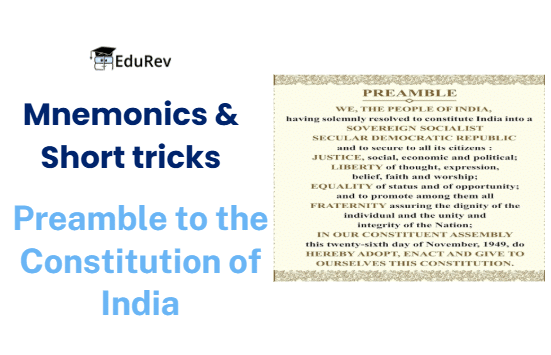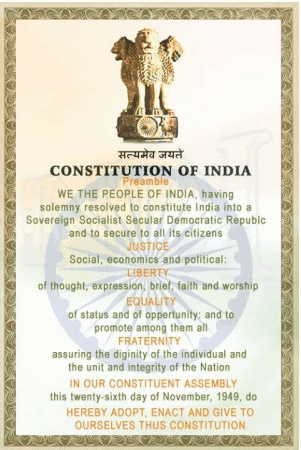Mnemonics : Preamble | Indian Polity for UPSC CSE PDF Download
This document will help you understand the key aspects of the Preamble of the Indian Constitution in a simple and engaging way. Inside, you'll find easy memory tricks (mnemonics) to help you recall its ideals, significance, and key terms like Sovereign, Socialist, Secular, and Democratic Republic.

Whether you're preparing for the UPSC, SSC CGL, or any other competitive exam, these mnemonics will make studying the Preamble easier and more effective. Use them alongside your regular studies to grasp concepts quickly and retain information for a longer time!
Key concepts of the Preamble
Mnemonic : " Some Smart Students Dance Rapidly Jumping Like Energetic Fish"
Each bold letter represents a key concept of the Preamble
S – Sovereign
S – Socialist
S – Secular
D – Democratic
R – Republic
J – Justice
L – Liberty
E – Equality
F – Fraternity

Relation with the constitution
Mnemonic: "Good Boys Keep Learning Always"
Each word represents a key case:
G – Gopalan Case (1950) → Preamble not enforceable, not a part of the Constitution.
B – Berubari Case (1960) → Preamble is only an introduction, not used for interpretation.
K – Kesavananda Bharati Case (1973) → Preamble is part of the Constitution and forms the basic structure.
L – LIC of India Case (1995) → Preamble is important but not enforceable in courts.
A – Amendment (42nd Constitutional Amendment, 1976) → Added Socialist, Secular, Integrity.
|
170 videos|999 docs|259 tests
|
FAQs on Mnemonics : Preamble - Indian Polity for UPSC CSE
| 1. What are the key concepts outlined in the Preamble of the Constitution? |  |
| 2. How does the Preamble relate to the Constitution as a whole? |  |
| 3. Can the Preamble be amended or changed? |  |
| 4. What is a mnemonic to remember the key aspects of the Preamble? |  |
| 5. Why is the Preamble important in legal interpretations? |  |

















